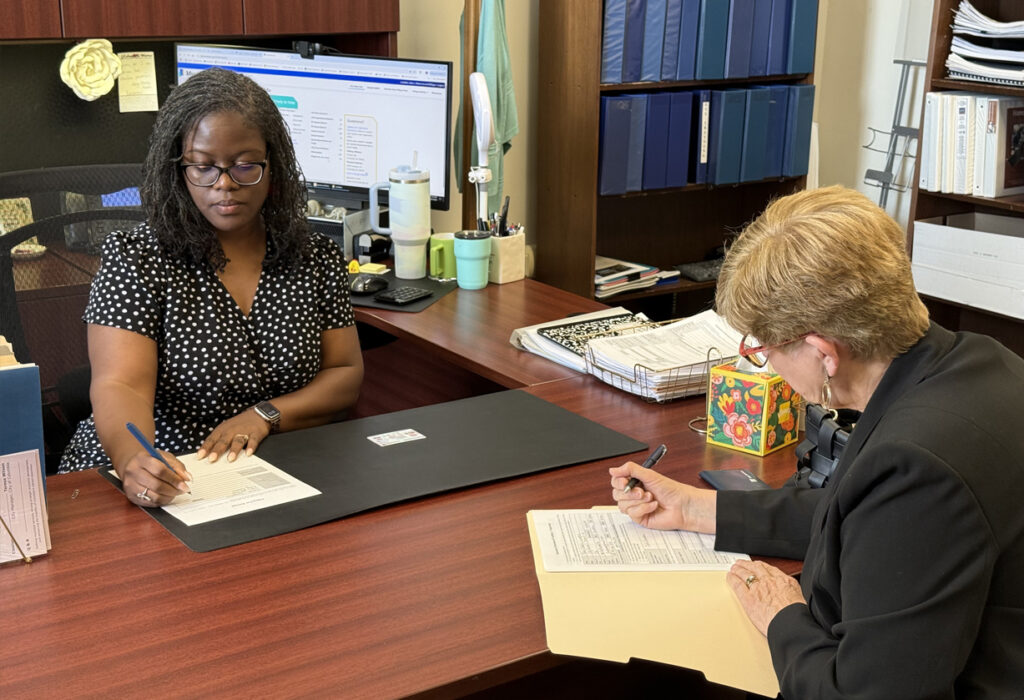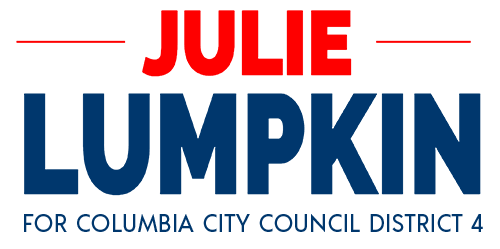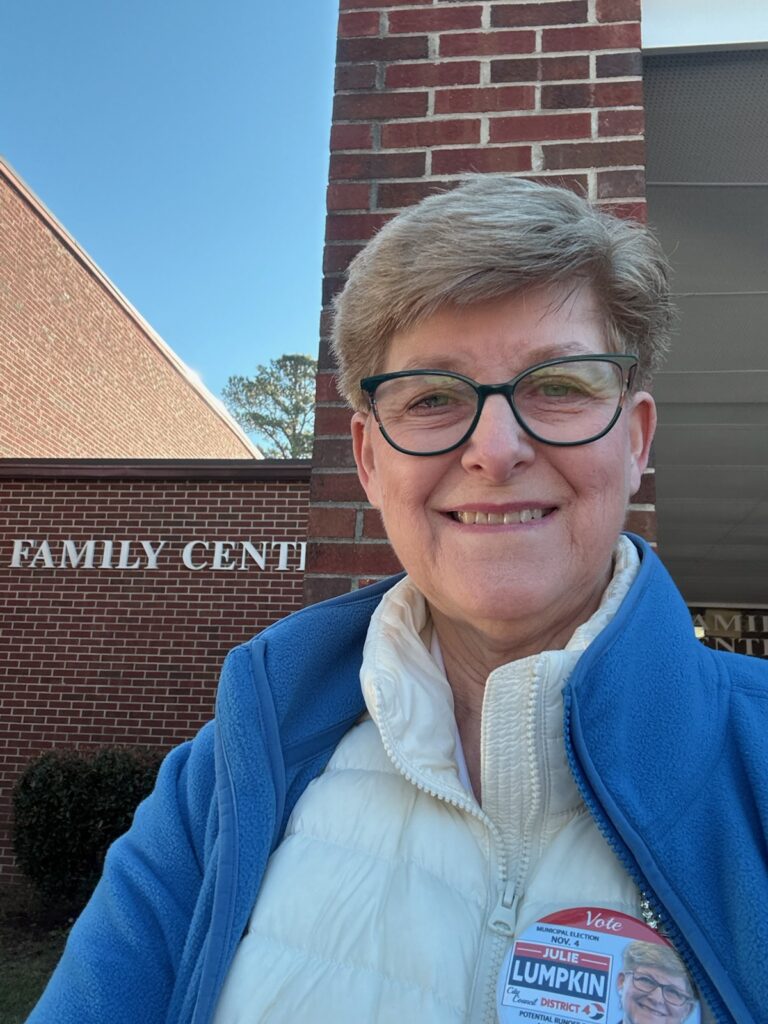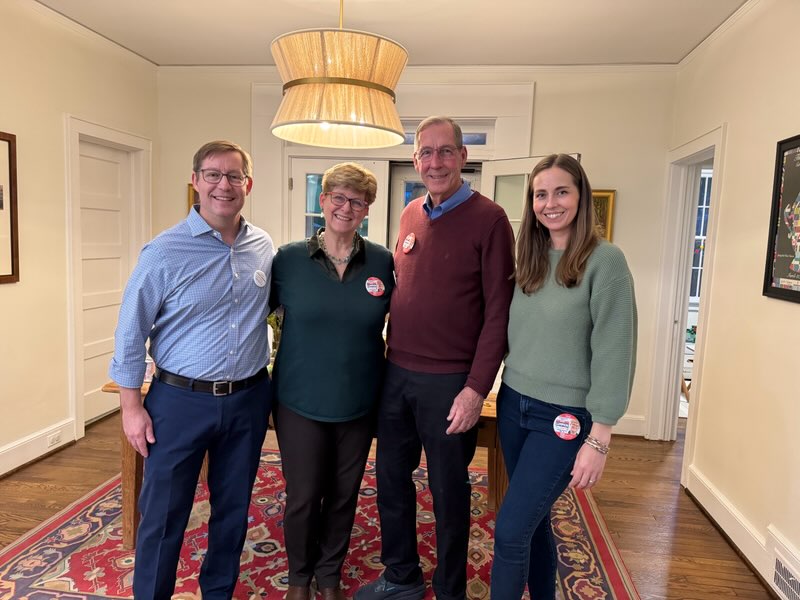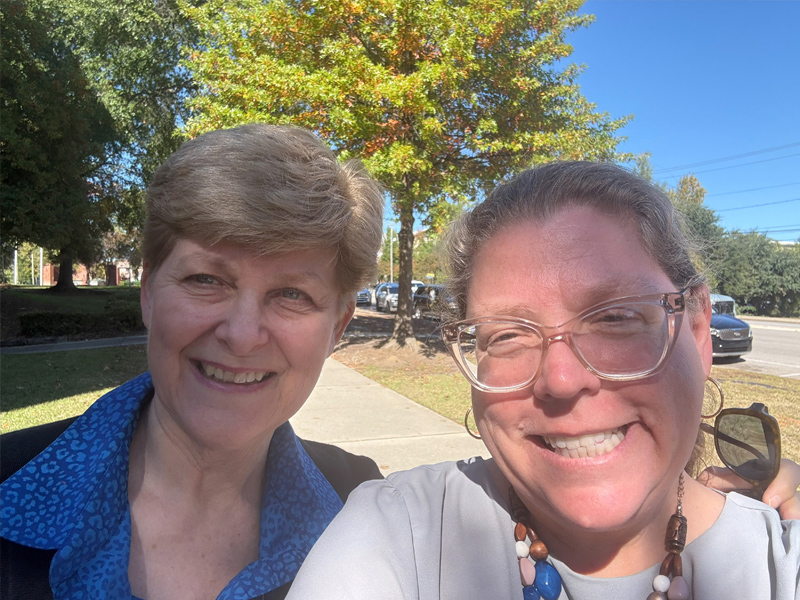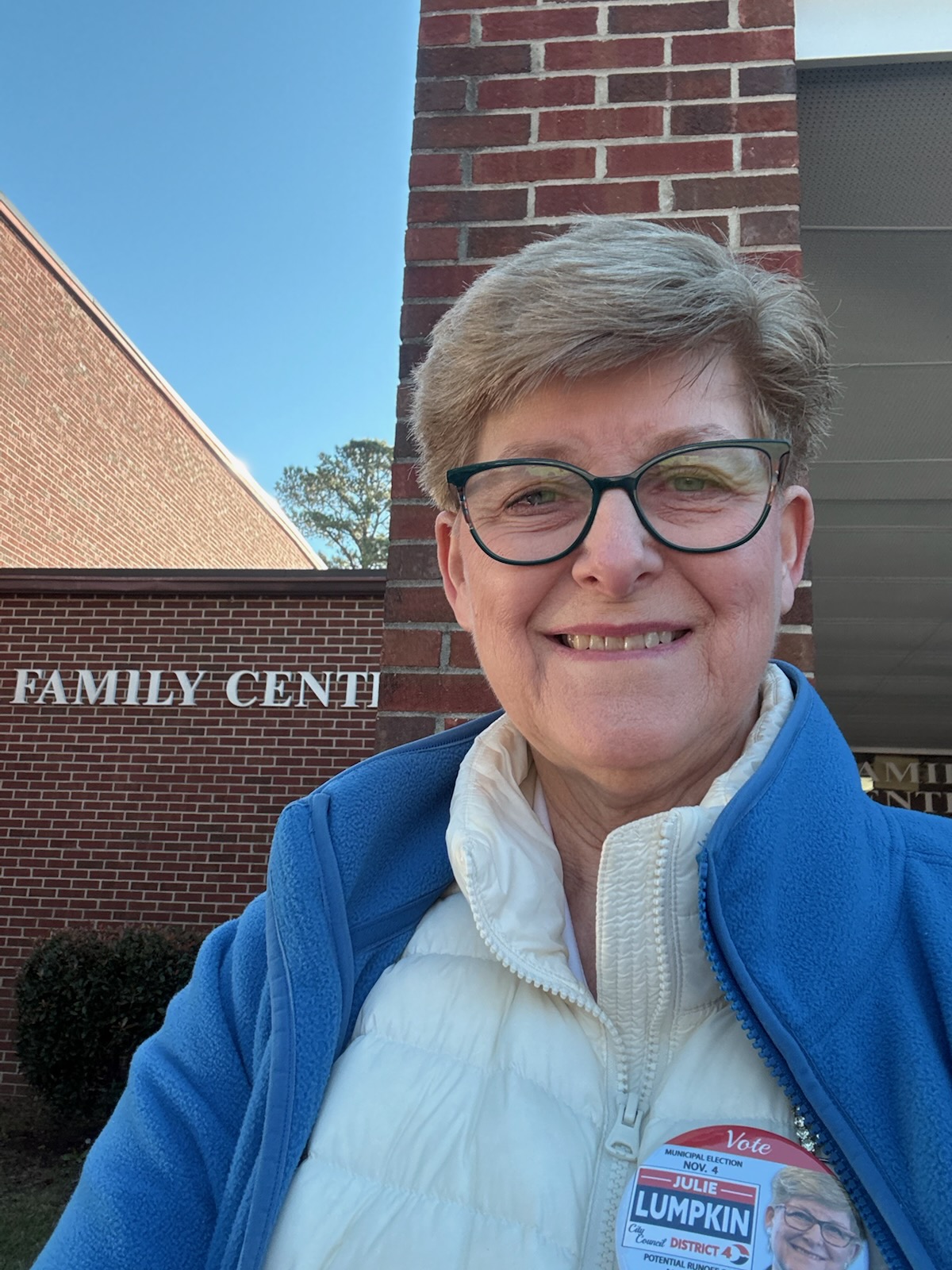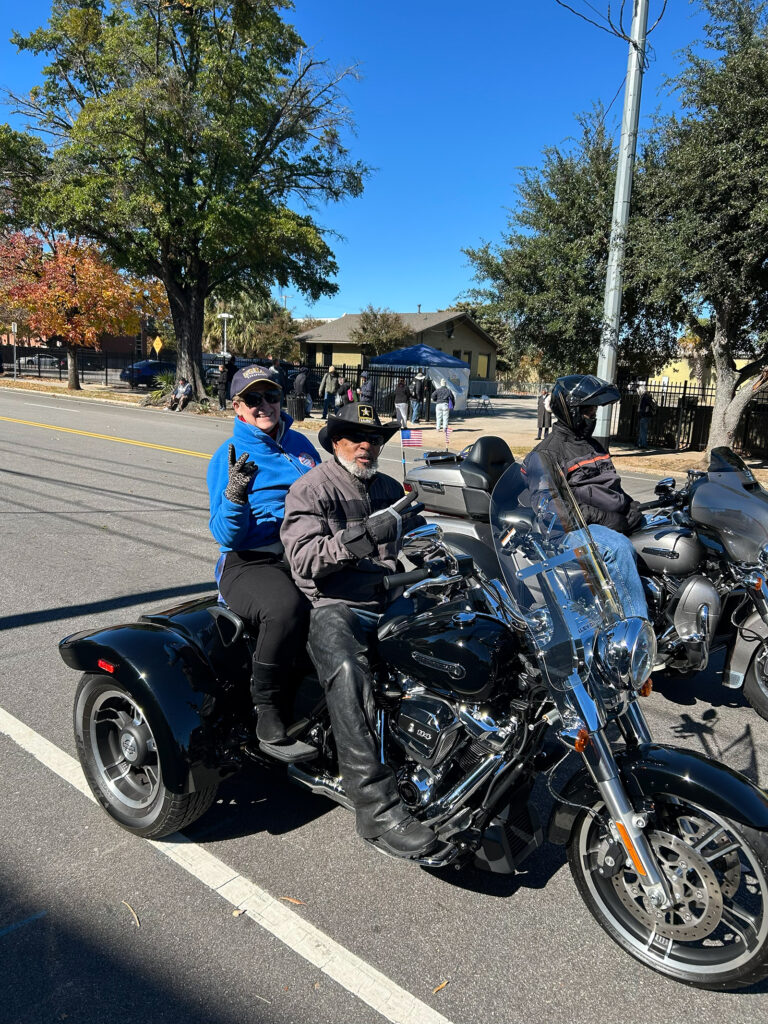News & Events
UPDATE as of 11.19.25
In the final results for the Columbia City Council District 4 race, 4,020 total votes were cast out of a total of ~25,000 voters registered in the district. (With absentee, early votes, and provisional ballots included, this count is slightly higher than previously posted.) The 2-year incumbent, Peter Brown, received 2,185 (54.4%) votes, and the challenger, Julie Lumpkin, received 1,835 (45.6%), making a 350-vote difference. Lumpkin considered the single-digit margin, ie, roughly 9 percentage points, a “win,” reflecting Blue Wave trends in the special elections in South Carolina and in the country as a whole in 2025.
A key take-away from this election was that Lumpkin’s campaign, along with Ashley McCall’s in the general election, revealed the potential of new municipal election voters or new voters moved into the district. These voters reside in the precincts beyond the in-town established neighborhoods and in high-growth areas along the district’s border. In the General Election, Lumpkin’s and McCall’s votes combined exceeded Brown’s by more than 53%, which led to the run-off between Brown and Lumpkin, who earned more votes than McCall. This bodes well for future candidates running in City District 4, as well as Senate and House members whose legislative districts include parts of District 4. Increased Democratic, Independent, and cross-over Republican voter turn-out could flip this city district, originally designed to favor Republicans.
My sincerest thanks again to supporters of the Lumpkin4Columbia Campaign and voters in the District 4 City Council election.
– Julie Lumpkin
Lumpkin Falls Short by 345 Votes
Three hundred and forty-five votes was the difference between votes cast for Julie Lumpkin and Peter Brown, with Brown’s votes exceeding Lumpkin’s, in the Runoff Election Tuesday November 18.
Brown, the incumbent for City Council District 4, was re-elected to serve 4 more years. The results were 1,942 (54.9%) votes cast for Brown, and 1,597 (45.1%) for Julie Lumpkin. This was a vote difference of 345 votes out of a total of 3,539 votes cast. The total number of registered voters in District 4 is 25,085, showing the ongoing challenge of increasing voter turn-out.
From the outset, Lumpkin stated she was running to give voters a choice, because she the incumbent had no opposition until the last week of filing. Brown had served less than two years, after he was elected in a Special Election in 2023 upon the untimely death of Joe Taylor, the previous incumbent.
During her 97-day campaign, Lumpkin participated in 5 Media Interviews (4 TV, 1 radio), 5 Municipal Candidate Questionnaires, 5 Municipal Candidate Forums, 6 Meet & Greets, and numerous appearances and stump speeches to community organizations and churches. Thousands of doors were knocked, phone calls made, mailers and postcards sent, and digital ads released as part of campaign outreach, along with her website updates and social media.
As a result of two completed questionnaires, background research, and an interview, Lumpkin was endorsed by The State Newspaper (SC McClatchy Editorial Board) and SC Equality. She was also endorsed by Sen. Tameika Isaac Devine, Rep. Heather Bauer, former Councilman Howard Duvall, and the third candidate in the race, Ashley McCall.
Lumpkin extends her heartfelt thanks to all her supporters and donors, friends and family, who energized and inspired her in this first run for elected office. “I remain interested in the varied concerns affecting Columbia residents, such as affordable housing, static wages, better roads, safe streets, and humane solutions for the unhoused,” Lumpkin said. “I will continue to push to put the public back into public service!”
On Veteran’s Day, Nov. 11, 2025…
Today I had the honor of riding on a motorcycle behind Mr. Roland Holland of the Combat Veterans Group in Columbia’s Veteran’s Day Parade. Mr. Holland served in Desert Storm and retired from the US Army after 20 years of service. He recently moved to Columbia from Maryland. I told him I was riding with him in honor of my Dad who served in WWII, 1941-1945.
My dad, the Rev. William W. Lumpkin, was mainly an Episcopal parish priest, but he interrupted his career to serve as a military chaplain. An unusual and precious family memento is a photograph of him celebrating Eucharist service on Christmas Eve in a wooden shelter while stationed at Tarawa, in the Pacific Islands. Dad didn’t tell us about his time much, but we do know that he was a pastor to all soldiers, regardless of faith, he took up arms to defend himself and others when needed, and prayed Last Rites over fallen soldiers on the beaches of Tarawa.
So today I honor my Dad, my uncles who served in the European theatre during WWII, and the men and women of all conflicts in the 20th and 21st centuries. We hold a debt of gratitude for those who fight to defend our democracy and the principles on which democratic countries are founded.
May we remember, that Democracy, though imperfect, is superior to all other forms of government, because it upholds the rights and protects the freedoms of each member of American society, regardless of race, ethnicity, creed, religion, gender or sexual orientation. That is the Democratic Ideal, and we who are here right now must pledge to defend this Ideal at home, just as our combat soldiers do abroad.
This is from the heart: Thank you, Veterans! Thank you All!
Julie Lumpkin, Candidate
Columbia City Council District 4
Julie Lumpkin (D) has been endorsed by Ashley McCall (D) in the District 4 race to unify Democratic voters.
Julie received the 2nd highest vote count against Incumbent Peter Brown, who fell short of winning outright.
SC Equality Coalition Announces City of Columbia Endorsements
October 21, 2025
South Carolina Equality Coalition (SCEC) is a 501(c)(4) statewide organization dedicated to advancing LGBTQ+ equality through advocacy and legislation. We proudly announce our municipal endorsements for the City of Columbia’s 2025 elections, including races for Mayor, At-Large Council, District 1, and District 4. These endorsements reflect our mission to promote fairness and inclusion for all LGBTQ+ South Carolinians. Each endorsed candidate completed SCEC’s municipal questionnaire, participated in interviews, and was reviewed and approved by our Board of Directors. In a time when equality is under attack across the country, local leadership matters. The people we elect to city offices shape our daily lives — from ensuring inclusive public spaces and housing to protecting Pride celebrations and affirming all families. As a Pro-Equality voter, we urge you to support these candidates who will be strong voices for fairness, dignity, and justice in Columbia’s local government.
SCEC is Proud to Endorse these Candidates
Julie Lumpkin
District 4, City of Columbia
Upcoming Events
District Four Runoff Election Day: Tues Nov 18
Past Events Attended
Oct. 25
10-11:30 am
Carolina for All Candidates Forum
GROW Building, 1340 Elmwood Ave
Oct. 20
6:00-8:00 pm
Columbia College and SGA Candidates Forum
Spears Theatre, Columbia College Drive
More News
The McClatchy South Carolina Editorial Board endorses Julie Lumpkin for Columbia City Council District Four
October 16, 2025 Online
October 19, 2025 Print
The McClatchy South Carolina Editorial Board is making endorsements in races for mayor and three City Council seats in Columbia after interviewing the candidates and independently researching them and their backgrounds.
In the City Council District Four race, one candidate rose above the rest. Ultimately, a vote for either Brown, 60; Lumpkin, 73; or McCall, 32, would be a fine decision, but we thought Lumpkin showed the deepest understanding and the most solutions-oriented mindset in the council race.
“Lumpkin showed the deepest understanding and the most solutions-oriented mindset in the council race.”
Lumpkin’s thoughtful, substantive answers to our candidate Q&A stood out from her opponents’ replies. McCall’s paled in comparison, and Brown’s answers were surprisingly short on substance and specifics. Asked to directly address several issues — from improving public safety to protecting a nearly $25 million investment in Finlay Park to listing one budget cut and one new expense that was necessary, and why — Brown offered general, non-responsive answers.
If you didn’t know which candidate was the incumbent, it would be easy to read the three Q&As and guess that it was Lumpkin. Asked which unmentioned issue deserves more attention, Brown answered, “How much good stuff is going on in Columbia? … Columbia is on a roll, and it is not an accident.” He added, “It is time that the media recognize the progress as well.”
Columbia is on the rise, but, like any American city, it has issues. And our open-ended question was designed to test each candidate’s knowledge of those problems as well as how they think.
We thought that Lumpkin aced the assignment and showed that she might be a different kind of council member. “The city needs to establish a more intentional relationship with its neighborhoods, rebuild relationships and generate reciprocal dialogue and problem-solving,” she told us. “In District 4 many neighborhood associations are actively seeking to maintain and improve their neighborhoods. They would welcome more involvement from their Council representative, and I plan to be very involved. As their councilwoman, I will be very involved.”
McCall’s answer to the same question was equally holistic. She’d focus more on community health and well-being, which she called the “thread that ties everything together.” Yet given the totality of their answers, that response didn’t give McCall, who has a master’s degree in social work, the edge over Lumpkin, who has a master’s of science degree in public health.
McCall’s voter records also show she votes infrequently, skipping city general elections in 2019, 2021 and 2023. Lumpkin and Brown have long voting histories and rarely miss elections.
Lumpkin also offered a far more detailed answer when asked about the state’s recent threat to withhold millions of dollars in funding from the city if it didn’t repeal its conversion therapy ban.
Brown and McCall gave stock answers about case-by-case scenarios while Lumpkin offered a full-throated defense of “home rule” protections that the city weakened by overturning its ban. She also said she would have considered offers from outside lawyers to represent Columbia pro bono to “argue that the state was overstepping its authority in threatening” the city.
Read The State’s full endorsement here.
October 4, 2025 – the 10th Anniversary of the 1,000-Year Flood in Columbia
October 4, 2025
The 1,000 Year Flood in Columbia (2015) had a tremendous impact on residents in District 4. The impact is still evident in bridges left unreplaced and damaged properties left unrepaired. This, along with a string of brand new homes brightening some neighborhood streets. But mostly the impact is felt in District 4 residents’ lingering memories, of dramatic rescues to escape flood waters, landscaping and homes damaged beyond repair, and in a few tragic instances, the loss of human life. While it was called a 1,000-year flood event, it’s possible serious flooding could happen again in our lifetimes due to climate change. Should we wait to be sitting ducks again? No! We can urge Council to develop a flood resiliency plan.
If elected to Council, I will advocate for the city to allocate some of its increased water services revenues to conduct water flow studies and to develop a flood resiliency plan in the Gills Creek Watershed (https://budget.columbiasc.gov/wp-content/uploads/2025/08/FY-25-26-Adopted-Budget-website.pdf). This watershed flows through much of District 4, which includes the residential lake systems connected by Gills Creek and its tributaries down to lower Devine Street past Midlands TEC and Gills Creek Parkway. Having worked in a scientific consulting firm, I understand that detailed hydrology studies could guide us in developing a long-term flood resilience plan to protect neighborhoods.
An analogy given to me was seeing the lake and stream system as bowls with straws connected to them. You can imagine that when a lake overflows or overtops a dam, the stream is like a straw trying to collect the overflow. As they are now, the streams are not wide or deep enough to channel the water, causing choke points. The purpose of these studies would be to measure the shape and depth of the stream bed to determine where to dredge to reduce choke points when water backs up. Once this data is collected, a plan can be developed to increase the capacity of Gills Creek between the lakes. Additional funds would need to be allocated to actually map the system more accurately. This would serve to support a flood resiliency plan, with the goal of reducing the damage and the enormous cost from losses due to needed repairs and destruction.
Julie Lumpkin Files to Run for Columbia City Council District 4
August 15, 2025
